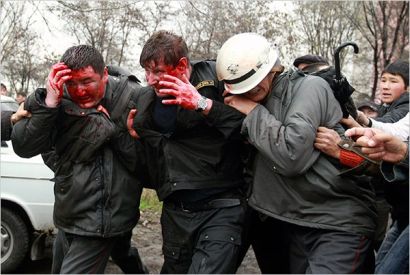
The recent unrest in the former Soviet republic of Kyrgyzstan hardly registered on America’s radar screen, but according to Fyodor Lukyanov of Russia’s Gazeta newspaper, the events there and around Eurasia far outweigh U.S.-Russia cuts in the nuclear weapons. In Lukyanov’s words, the U.S. and Russia require a ‘new deal’ to replace the understandings reached between Putin and Bush after the terrorist attacks of 2001.
For Gazeta , Fyodor Lukyanov writes in part:
Once the whole world watched how relations between the two nuclear superpowers unfolded, because almost the entire tone of international affairs depended on it. Now everything is different. Let’s say for example that the treaty wasn’t signed, or isn’t ratified. What would happen? Even the densest of hawks doesn’t expect a nuclear war. Reductions in missiles and warheads will occur within the context of ordinary attrition and technological upgrading. At the same time, neither country will fall to a level that would deprive it of its exclusive status and the capacity for mutually assured destruction (and have not fallen to such a level under the new treaty).
The U.S. military presence in Central Asia is one of the fruits of the “anti-terrorist coalition” proclaimed after the attacks of September 11, 2001. At the time, Presidents Vladimir Putin and George W. Bush signed a sort of informal agreement; in any case, that’s how it was understood in Moscow. Russia didn’t prevent penetration by the United States into a region where Moscow had a dominant influence. In return, Russia expected qualitatively different relations with Washington. Apparently, the United States sees the essence of the “contract” differently: America takes the brunt of the war with the new “absolute evil,” and in return other countries are to provide their complete support.
The Kremlin soon became disillusioned with the nature of the transaction. First, after the rapid defeat of the Taliban in Afghanistan, the long-term plans of the NATO operation hung in the air. No one believed in the likelihood of building a modern and democratic Afghanistan, so suspicions abounded that this was just an excuse to consolidate in a strategically-important part of Eurasia. Second, 2002-2005 saw a dramatic rise in the activity of American policy within the former Soviet Union, which was interpreted by Moscow as a violation of all gentleman’s agreements.
Now the fun begins – how will Russian-American relations unfold? The most unpleasant scenario: Russia strictly requires the “revolutionaries” to get rid of Manas; and the U.S. undertakes to buy off another Bishkek government. In this case, déjà vu awaits both great powers. Russia will again be deceived (not necessarily out of cunning, but simply because of the weakness of the Kyrgyz leadership and its incapacity to withstand pressure from the other side). And the United States will once again be touched by an unstable regime – a union that severely compromises it. Not to mention the fact that the dividends of this bout will be reaped by a third force: neighboring China.
Conversely, if Moscow and Washington can agree to rules of the game and respect for mutual interests, both can get their way. Russia will achieve stability in Kyrgyzstan and ensure its influence there and the U.S. will retain its base, which is important for the Afghan campaign – even more so, now that the Americans are trying to achieve decisive success and create the conditions for a gradual withdrawal. In other words, a “new deal” is needed to replace the one concluded in the autumn of 2001, and this time the terms and intents should be negotiated clearly and directly.
READ ON AT WORLDMEETS.US, your most trusted translator and aggregator of foreign news and views about our nation.
















